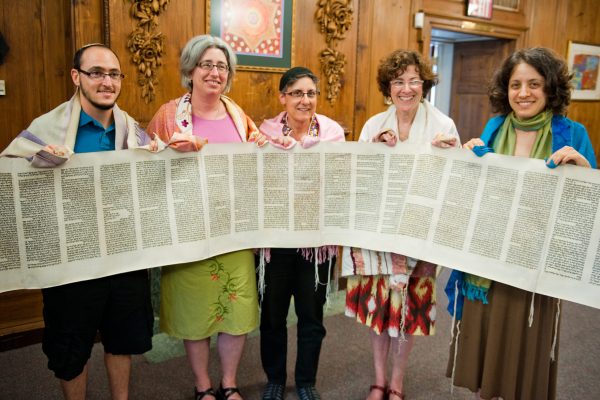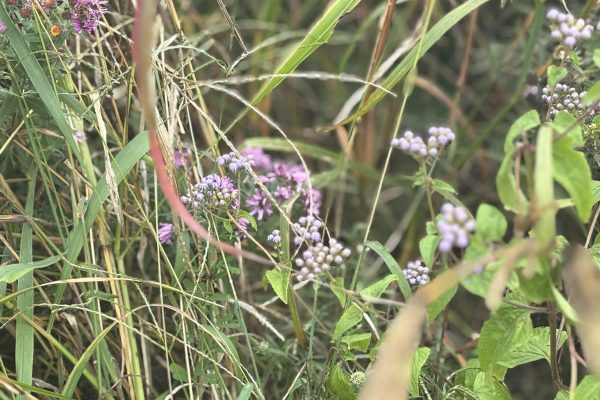Berakhah 1:
1. בָּרוּךְ אַתָּה יְ-יָ אֱלֹהֵ-ינוּ מֶלֶךְ הָעוֹלָם, בּוֹרֵא פְּרִי הַגָּפֶן
May your branches cling to one another—wild and overflowing. I bless you with sweet fruits and luscious sanctity.
*This berakhah—which is traditionally over the “fruit of the vine,” was influenced by Genesis 49:22: Jacob’s blessing for Joseph, where he describes Joseph as “a fruitful vine, a fruitful vine by a fountain; its branches run over the wall.”
Berakhah 2:
2. בָּרוּךְ אַתָּה יְ-יָ אֱלֹהֵ-ינוּ מֶלֶךְ הָעוֹלָם, שֶׁהַכֹּל בָּרָא לִכְבוֹדוֹ.
May you know one another fully and completely. May you come to learn and love each other’s light and darkness, each other’s blessings and shortcomings. May you help one another grow to better know yourselves, and may you live to be present with each other’s moments of peace and of pain. I bless you with finding and cultivating the places in each other where the entire universe—love and darkness, light and truth—can reside.
*In this berakhah, we note that God has “created all things for His glory.” I picked up on the phrase “all things,” realizing that this includes both good and bad. I was inspired by four key pieces of text: Isaiah 45:7 (“I form the light and create darkness; I make peace and create evil”), a quote by Pema Chodron (“Only when we know our own darkness well can we be present with the darkness of others”), a quote from Jessica Valenti (“The truth is that we don’t need everyone to like us, we need a few people to love us. Because what’s better than being roundly liked is being fully known”), and a poem by Ram Dass (“I honor the place in you where the entire Universe resides. I honor the place of love, of light, of truth, of peace. I honor the place within you where if you are in that place in you, and I am in that place in me, there is only one of us).
Berakhah 3:
3. בָּרוּךְ אַתָּה יְ-יָ אֱלֹהֵ-ינוּ מֶלֶךְ הָעוֹלָם, יוֹצֵר הָאָדָם.
I grant you the blessings of mystery and uncertainty. I bless you with the courage to not know—to love from the heart, not the head; to love even when you don’t know how; to love because you know no other way than this. I bless you with knowing one another better than yourself, and with knowing yourself through one another. I bless you with messiness and murkiness—with forgetting where one person stops and the other begins.
*The traditional third berakhah names God as the “creator of man.” I decided to pick up on some aspects of God’s initial human creations in the garden of Eden—particularly (1) that they had yet to eat from the Tree of Knowledge of Good and Evil and (2) that Adam and Eve were perhaps originally created as one being. This connected to a favorite poem by Pablo Neruda, “I love you without knowing how, or when, or from where. I love you straightforwardly, without complexities or pride; so I love you because I know no other way than this: where I does not exist, nor you, so close that your hand on my chest is my hand, so close that your eyes close as I fall asleep.”
Berakhah 4:
4. בָּרוּךְ אַתָּה יְ-יָ אֱלֹהֵ-ינוּ מֶלֶךְ הָעוֹלָם, אֲשֶׁר יָצַר אֶת הָאָדָם בְּצַלְמוֹ, בְּצֶלֶם דְּמוּת תַּבְנִיתוֹ, וְהִתְקִין לוֹ מִמֶּנּוּ בִּנְיַן עֲדֵי עַד: בָּרוּךְ אַתָּה יְ-יָ, יוֹצֵר הָאָדָם
May your marriage and your lives be guided by holy justice and principled action. May you find in one another the strength and resiliency to work on behalf of the oppressed and the downtrodden. May you walk together along a path of mercy, graciousness and righteousness. I give you a world in need of healing, and bless you with the power to heal.
*The traditional formulation of this berakhah blessed God for creating man in God’s image. I decided to flesh out what it means for us to be made in the image of God, influenced by sources culled by Rabbi Shai Held (who himself writes, “to side with the oppressed and act against injustice, the Torah subtly tells us, is to be like God”), Midrash Sifrei, Eikev 49 (“as God is called merciful so should you be merciful; as God is called gracious, so should you be gracious. As God is called righteous, so you too should be righteous”) and Masechet Sotah 14a (“As God clothes the naked, so you, too, clothe the naked; the Blessed Holy One visited the sick, so you, too, visit the sick. The Blessed Holy One comforted mourners, so you, too, comfort the mourners; the Blessed Holy One buried the dead, so you, too, bury the dead”).
Berakhah 5:
5. שׂוֹשׂ תָּשִׂישׂ וְתָגֵל הָעֲקָרָה, בְּקִבּוּץ בָּנֶיהָ לְתוֹכָהּ בְּשִׂמְחָה: בָּרוּךְ אַתָּה יְ-יָ, מְשַׂמֵּחַ צִיּוֹן בְּבָנֶיהָ.
May you sanctify my name through the lives you impact. May you spread a love for people of all nations and creeds, and may your deeds of kindness be as numerous as the stars of the heaven and the sands of the sea. I bless you with the ability to share the love you have for one another with any and every divine spark you encounter.
*The traditional fifth berakhah personifies Jerusalem as barren, happy at the “ingathering of her children.” I decided to play around with one of the biblical blessings of progeny (Genesis 22: “In blessing, I will bless you, and in multiplying I will multiply your seed as the stars of the heaven, and as the sand upon the seashore…and in your seed shall all the nations of the earth be blessed”), as well as an idea by Martin Luther King Jr. about “agape”—”Agape does not begin by discriminating between worthy and unworthy people…it begins by loving others for their sakes.”
Berakhah 6:
6. שַׂמַּח תְּשַׂמַּח רֵעִים הָאֲהוּבִים, כְּשַׂמֵּחֲךָ יְצִירְךָ בְּגַן עֵֽדֶן מִקֶּֽדֶם: בָּרוּךְ אַתָּה יְ-יָ, מְשַׂמֵּֽחַ חָתָן וְכַלָּה
May you know joy. May each other’s laughter be the question you spend your life trying to answer. May you serve to make life’s quakes gentler, and life’s shakes steadier, for one another. I bless you with a life of finding joy despite—or perhaps amidst—the trembles.
*In the traditional version of the sixth berakhah, we ask God to “grant joy to these loving friends.” I played around with the idea of joy, both with a quote from Nicole Krauss’s “The History of Love” (“Once upon a time there was a boy who loved a girl, and her laughter was a question he wanted to spend his whole life answering”) and from the Talmud, Masekhet Berakhot 30b (“In a place of joy there is also trembling”).
Berakhah 7:
7. בָּרוּךְ אַתָּה יְ-יָ אֱלֹהֵ-ינוּ מֶלֶךְ הָעוֹלָם, אֲשֶׁר בָּרָא שָׂשׂוֹן וְשִׂמְחָה, חָתָן וְכַלָּה, גִּילָה רִנָּה דִּיצָה וְחֶדְוָה, אַהֲבָה וְאַחֲוָה שָׁלוֹם וְרֵעוּת, מְהֵרָה יְ-יָ אֱלֹהֵ-ינוּ יִשָּׁמַע בְּעָרֵי יְהוּדָה וּבְחוּצוֹת יְרוּשָׁלָיִם, קוֹל שָׂשׂוֹן וְקוֹל שִׂמְחָה, קוֹל חָתָן וְקוֹל כַּלָּה, קוֹל מִצְהֲלוֹת חֲתָנִים מֵחֻפָּתָם, וּנְעָרִים מִמִּשְׁתֵּה נְגִינָתָם: בָּרוּךְ אַתָּה יְ-יָ, מְשַׂמֵּחַ חָתָן עִם הַכַּלָּה.
May you lead a life of sound and song. May you join together in songs of praise, songs of joy and songs of sorrow. May your voices provide comfort and solace, inspiration and ecstasy. May you find and create divinity in whispered “I love you’s” and in humble “I’m sorry’s.” I bless you with the capacity, and the lifelong desire, to hear each other’s calls.
*The final of the traditional sheva berakhot mentions “the sound of joy and the sound of happiness, the sound of a groom and the sound of a bride, the sound of exultation of grooms from under their huppah, and youths from their joyous banquets.” I wanted to open up this idea of what love or marriage sounds like. I also was drawing on the idea from Shochen Ad, the psalms that we proclaim God’s glory through song, a Heschel idea that “we sing to [God] before we are able to understand Him…Unless we learn how to sing, unless we learn how to love, we will never learn how to understand Him” and a verse from Song of Songs (“You that dwells in the gardens, the companions hearken for your voice: ’cause me to hear it'”).












3 Responses
Beautiful interpretations!!!Thank you, Rabbi Sarah! You deeply inspired me.
Beautiful! I am so excited to use this at our wedding. Thanks for the meaningful interpretations!
kol hakavod
Looking forward to including your words as an officiant at a wedding.
Rabbi Gila